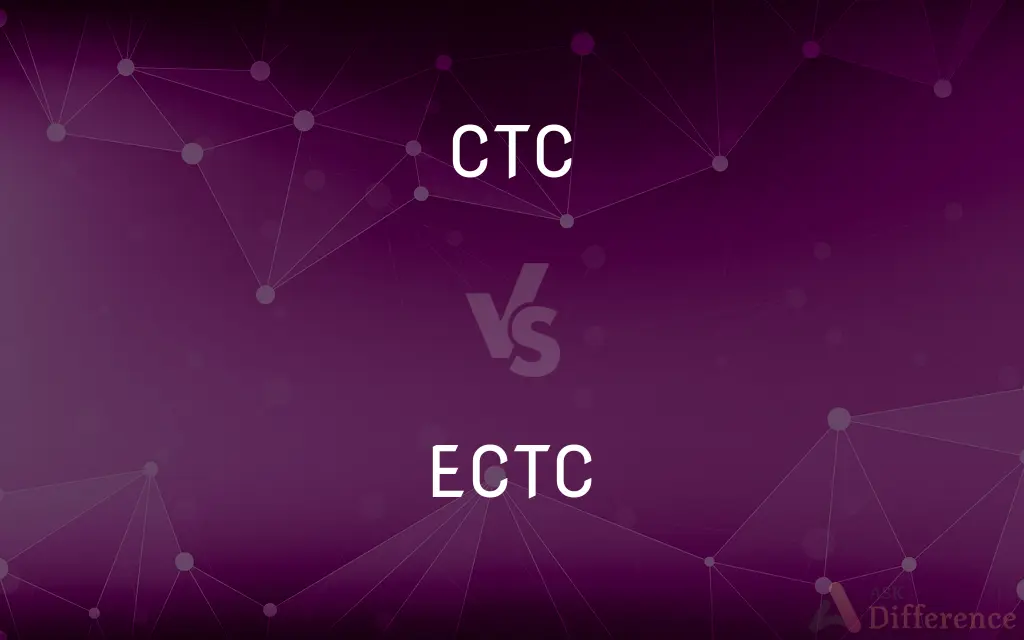CTC vs. ECTC — What's the Difference?
By Tayyaba Rehman & Urooj Arif — Published on February 4, 2024
CTC (Cost to Company) is the total cost an employer spends on an employee annually. ECTC (Expected Cost to Company) is the anticipated cost for a potential employee.

Difference Between CTC and ECTC
Table of Contents
ADVERTISEMENT
Key Differences
CTC, or Cost to Company, encompasses the total annual expense an employer incurs for an employee, including salary, benefits, and any other compensations. ECTC, or Expected Cost to Company, refers to the forecasted expense an employer anticipates for hiring a new employee, often discussed during job negotiations.
While CTC provides a clear picture of an employee's current financial package, ECTC is a projection used in job offers to indicate potential earnings and benefits. Both CTC and ECTC are crucial in understanding employment costs from both the employer's and employee's perspectives.
Understanding CTC is essential for employees to grasp the full value of their compensation, including all monetary and non-monetary benefits. In contrast, ECTC helps candidates evaluate future job offers and negotiate salaries based on their skills and market standards.
Employers use CTC to budget and manage payroll expenses, ensuring that employee costs align with company financial plans. ECTC, on the other hand, is a tool for strategic planning, helping companies forecast and allocate resources for new hires effectively.
CTC and ECTC differ in their application: CTC applies to current employees, reflecting actual costs, while ECTC is prospective, applying to potential employees during the hiring process. This distinction is critical for financial planning and human resource management.
ADVERTISEMENT
Comparison Chart
Definition
Total annual cost an employer spends on an employee
Forecasted expense for a potential employee
Application
Current employees
Potential hires during job negotiations
Components
Salary, benefits, taxes, etc.
Anticipated salary, projected benefits
Purpose
Budgeting and financial planning
Salary negotiation and resource allocation
Flexibility
Fixed based on contract
Negotiable based on candidate expectations
Compare with Definitions
CTC
CTC is a comprehensive metric that helps employees understand their complete compensation package.
I reviewed my CTC to understand the full value of my benefits and allowances.
ECTC
ECTC projections allow candidates to assess the growth opportunities and financial prospects of a new role.
The ECTC indicated strong growth potential within the company.
CTC
CTC represents the total financial commitment an employer makes towards an employee, including all forms of compensation.
My CTC includes my base salary, bonuses, and health insurance.
ECTC
ECTC is the expected financial package a company offers to a potential employee, including all proposed benefits.
The ECTC in my job offer was higher than I anticipated, reflecting a good bonus structure.
CTC
Understanding CTC is crucial for employees to gauge their true earning potential and value to the company.
I compared my CTC with industry standards to assess my market worth.
ECTC
ECTC serves as a starting point for salary negotiations between a candidate and an employer.
I used the ECTC as a baseline to negotiate a higher starting salary.
CTC
CTC includes not just the cash components but also indirect benefits like insurance and retirement contributions.
My CTC breakdown showed a significant portion allocated to my retirement fund.
ECTC
Prospective employees use ECTC to evaluate job offers and make informed decisions about their employment.
I compared the ECTC of several job offers to decide which position to accept.
CTC
CTC is used by companies to calculate the total expenditure on each employee per year.
The finance department calculates the CTC for budgeting and payroll purposes.
ECTC
ECTC helps candidates understand what they can expect to earn, including potential bonuses and incentives.
The job offer listed an ECTC that included performance-related bonuses.
CTC
An agency that helps the Director of Central Intelligence coordinate counterterrorist efforts in order to preempt and disrupt and defeat terrorist activities at the earliest possible stage
Common Curiosities
What does CTC stand for?
CTC stands for Cost to Company, representing the total annual cost an employer incurs for an employee.
Can CTC change annually?
Yes, CTC can change annually based on performance reviews, promotions, or changes in company policies regarding compensation.
What is the significance of understanding CTC for employees?
Understanding CTC is crucial for employees to grasp the full scope of their compensation and make informed financial decisions.
What does ECTC mean?
ECTC stands for Expected Cost to Company, which is the forecasted expense for a potential employee, often used in job negotiations.
Is ECTC always accurate?
ECTC is an estimate and may not always be accurate; it can change based on negotiations or alterations in job roles.
Why is ECTC important for job seekers?
ECTC is important for job seekers as it provides an insight into the potential earnings and benefits of a job offer, aiding in decision-making.
How is CTC calculated?
CTC is calculated by summing up all components of an employee's compensation, including salary, benefits, bonuses, and any other perks.
What factors influence ECTC?
ECTC is influenced by factors such as industry standards, candidate's experience, expected roles and responsibilities, and market demand for the skill set.
Does CTC include taxes?
Yes, CTC includes taxes and any other deductions that are part of the employee's compensation package.
How should one negotiate ECTC?
Negotiating ECTC involves discussing salary, benefits, and other compensations based on one's experience, industry benchmarks, and the specific job role.
Can ECTC include variable components?
Yes, ECTC can include variable components such as bonuses, incentives, and performance-related pay.
Is it possible for ECTC to be lower than CTC?
Typically, ECTC is an offer for future employment and may vary from current CTC based on negotiations and job market value.
How do companies determine ECTC for a role?
Companies determine ECTC based on the role's requirements, budget constraints, and the value the candidate brings to the position.
What role does HR play in defining CTC and ECTC?
HR departments play a key role in defining CTC and ECTC, ensuring they align with company policies, budget, and market standards.
How do benefits impact CTC and ECTC?
Benefits are a significant part of both CTC and ECTC, affecting the total value of the compensation package and its attractiveness to employees or potential hires.
Share Your Discovery

Previous Comparison
Confidence vs. Overconfidence
Next Comparison
Rydberg Formula vs. Balmer FormulaAuthor Spotlight
Written by
Tayyaba RehmanTayyaba Rehman is a distinguished writer, currently serving as a primary contributor to askdifference.com. As a researcher in semantics and etymology, Tayyaba's passion for the complexity of languages and their distinctions has found a perfect home on the platform. Tayyaba delves into the intricacies of language, distinguishing between commonly confused words and phrases, thereby providing clarity for readers worldwide.
Co-written by
Urooj ArifUrooj is a skilled content writer at Ask Difference, known for her exceptional ability to simplify complex topics into engaging and informative content. With a passion for research and a flair for clear, concise writing, she consistently delivers articles that resonate with our diverse audience.
















































